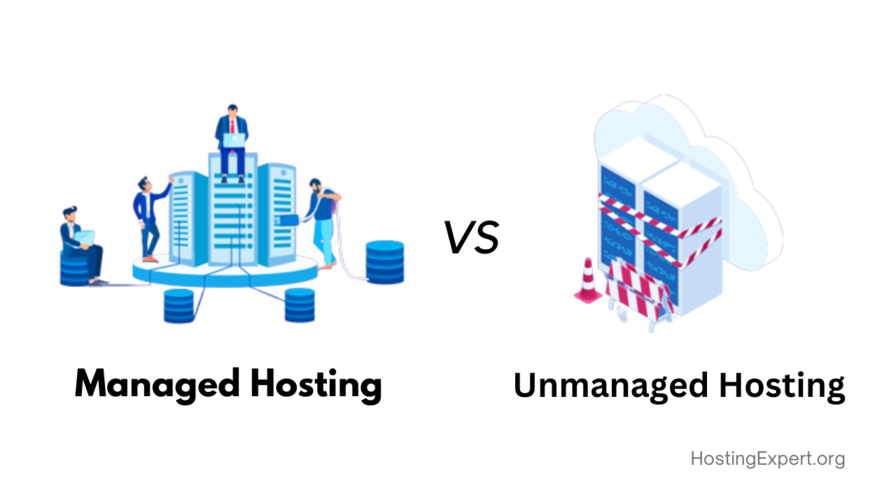Managed vs Unmanaged Hosting: Which is Right for You?
Choosing the right hosting solution for your website is crucial. It can significantly impact your site’s performance, security, and overall success. Two common options that often come up in this decision-making process are managed and unmanaged hosting. In this comprehensive guide, we’ll dive deep into the world of hosting services, exploring the differences, advantages, and disadvantages of managed and unmanaged hosting. By the end of this article, you’ll have a clear understanding of which option is right for you.
Understanding Managed Hosting
What is Managed Hosting?
Managed hosting is a hosting service where the provider takes care of all the technical aspects of running a website. This includes server maintenance, security, updates, and more. Users of managed hosting plans can focus on their website’s content and business aspects without worrying about the technicalities.
Advantages of Managed Hosting
1. Enhanced Security
Managed hosting providers invest heavily in security measures. They regularly update and patch the server, monitor for potential threats, and provide robust firewalls. This significantly reduces the risk of cyberattacks and data breaches.
2. Expert Support
With managed hosting, you have access to a team of experts who can assist you 24/7. Any technical issues or questions you have will be addressed promptly, ensuring minimal downtime for your website.
3. Automatic Updates
Software and server updates are handled automatically by the hosting provider. This ensures that your website always runs on the latest, most secure technology.
4. Scalability
Managed hosting plans often allow for easy scalability. As your website grows, you can upgrade your plan to accommodate increased traffic and resource demands.
Disadvantages of Managed Hosting
1. Higher Cost
The convenience of managed hosting comes at a price. It’s generally more expensive than unmanaged hosting, which might not be suitable for budget-conscious website owners.
2. Less Control
Since the hosting provider manages the technical aspects, you have less control over server configurations and settings. This can be a limitation if you require specific customization.
Understanding Unmanaged Hosting
What is Unmanaged Hosting?
Unmanaged hosting, also known as self-managed hosting, provides you with a server, and you are responsible for all aspects of its maintenance and management. This option is ideal for users who have technical expertise or require a high degree of customization.
Advantages of Unmanaged Hosting
1. Cost-Effective
Unmanaged hosting is generally more budget-friendly than managed hosting. It’s a suitable option for those who are comfortable handling server-related tasks themselves.
2. Full Control
With unmanaged hosting, you have complete control over server configurations. This level of customization allows you to tailor the server to your specific needs.
3. Learning Opportunity
Managing your server can be a valuable learning experience. It allows you to gain in-depth knowledge of server administration and web hosting.
Disadvantages of Unmanaged Hosting
1. Technical Expertise Required
This option is not suitable for beginners or those without technical skills. Managing a server can be complex and time-consuming.
2. Security Responsibility
Security updates and monitoring are your responsibility. Failing to keep up with security measures can lead to vulnerabilities and potential threats.
Managed vs Unmanaged Hosting: Making the Choice
When deciding between managed and unmanaged hosting, consider the following factors:
1. Technical Expertise
If you have the technical know-how to manage a server effectively, unmanaged hosting can be a cost-effective choice. On the other hand, if you lack technical skills or prefer to focus on your website’s content, managed hosting is a safer bet.
2. Budget
Your budget plays a significant role in this decision. Managed hosting is more expensive but comes with added convenience and support. Unmanaged hosting is budget-friendly but requires more effort and expertise.
3. Time Commitment
Managing an unmanaged server can be time-consuming. If you have limited time to devote to server maintenance, managed hosting is the way to go.
4. Growth Plans
Consider your website’s growth potential. Managed hosting allows for easier scalability, making it suitable for rapidly expanding websites.
FAQs
Q: Is managed hosting suitable for small websites?
Yes, managed hosting is suitable for small websites. It provides security and support that can benefit websites of all sizes.
Q: Can I switch from managed to unmanaged hosting or vice versa?
Yes, most hosting providers offer the flexibility to switch between managed and unmanaged hosting plans based on your changing needs.
Q: Are there any hidden costs with managed hosting?
While managed hosting is more expensive upfront, it typically includes all necessary services. Be sure to review the hosting provider’s terms to avoid unexpected costs.
Q: Can I get technical support with unmanaged hosting?
Unmanaged hosting typically does not include technical support. You are responsible for all server-related tasks.
Q: Is unmanaged hosting recommended for e-commerce websites?
Unmanaged hosting can be suitable for e-commerce websites with experienced administrators who can handle server maintenance and security.
Q: Which hosting option is more beginner-friendly?
Managed hosting is more beginner-friendly as it takes care of technical aspects, allowing users to focus on content creation.
Conclusion
Choosing between managed and unmanaged hosting ultimately depends on your technical skills, budget, and time commitment. Managed hosting offers convenience and expert support, while unmanaged hosting provides full control and cost-effectiveness. Consider your website’s needs and your own capabilities when making this important decision. By doing so, you can ensure a hosting solution that aligns perfectly with your goals.


